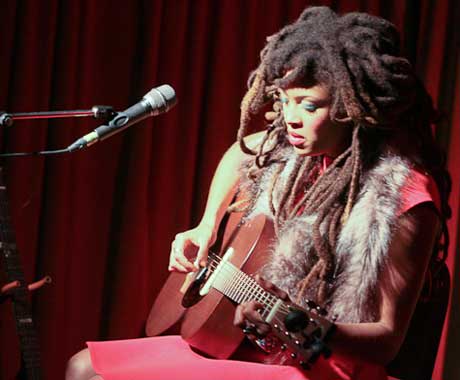The problem with live shows at a Queen Street "hot spot" is that you never know why exactly people are there. Too much time rubbernecking in a crowded, cramped space gives one the impression that some are more concerned with who might appear, versus the performer onstage. While opener Michael Rault gave an incredible set — quite possibly the strongest and most suitable opener that Valerie June will have on her tour in these parts — the background chatter and ringing cellphones dampened the mood and quite frankly, showed a blatant lack of respect for the Toronto-based singer-songwriter whose original tracks, such as "I Fall in Love With Every Girl I See" and "Too Bad So Sad" deserved the crowd's rapt attention. Armed only with an electric guitar and portable amp, Rault performed a selection of blues-infused garage rock from 2010's MA-ME-O, and material so new that he said it wasn't even on his latest EP, Whirlpool.
Thank goodness you could have heard a pin drop when Valerie June began. Resplendent in a hot-pink dress with a fur (lets hope it was fake) collar and lime green cowboy boots, her between-song banter was just as precious as her voice, which is saying a lot, as one of the concerns about seeing her live after listening to her latest album, Pushin' Against a Stone was how her voice was a bit shrill when accompanied by a full band. Live, it all made sense; watching her sing, you could see and feel her voice, and more importantly, feel her interpretation of songs like "Somebody to Love," Shotgun" and "Workin' Woman's Blues" that were altered for her one-woman touring show. Her strong voice brought texture and an immediate recognition of her fondness for bluegrass and Appalachian mountain music.
Alternating between a banjo and her amplified acoustic guitar, she delicately wrapped a blue silk handkerchief around her finger to use as a slide. With her left foot she kept her rhythm with a kick drum and with her right, she deftly manoeuvred the tambourine that sat on the floor. For someone who didn't start taking her guitar playing seriously until she was 22, her string work on "Tennessee Time" was extremely impressive and instinctual.
At one point she said — rather sadly and almost as an apology — "I'm a songwriter and I live in a different world and I bring it here," which succinctly described her presence. When watching her perform "Tennessee Time," she wasn't a beautiful, dreadlocked, eccentric-looking African-American woman; she was an interpreter of the spirit of the music she has deftly adopted. While there were a few audience members whose catcalls — not necessarily mean but mildly patronizing — made you wonder if this woman represented more to them than just a talented young singer and songwriter, when she wandered through the crowd during her encore, singing a cappella and shaking her tambourine, there was a realization that her unique music and spiritual presence made it okay for her to be not like the rest of us.
Thank goodness you could have heard a pin drop when Valerie June began. Resplendent in a hot-pink dress with a fur (lets hope it was fake) collar and lime green cowboy boots, her between-song banter was just as precious as her voice, which is saying a lot, as one of the concerns about seeing her live after listening to her latest album, Pushin' Against a Stone was how her voice was a bit shrill when accompanied by a full band. Live, it all made sense; watching her sing, you could see and feel her voice, and more importantly, feel her interpretation of songs like "Somebody to Love," Shotgun" and "Workin' Woman's Blues" that were altered for her one-woman touring show. Her strong voice brought texture and an immediate recognition of her fondness for bluegrass and Appalachian mountain music.
Alternating between a banjo and her amplified acoustic guitar, she delicately wrapped a blue silk handkerchief around her finger to use as a slide. With her left foot she kept her rhythm with a kick drum and with her right, she deftly manoeuvred the tambourine that sat on the floor. For someone who didn't start taking her guitar playing seriously until she was 22, her string work on "Tennessee Time" was extremely impressive and instinctual.
At one point she said — rather sadly and almost as an apology — "I'm a songwriter and I live in a different world and I bring it here," which succinctly described her presence. When watching her perform "Tennessee Time," she wasn't a beautiful, dreadlocked, eccentric-looking African-American woman; she was an interpreter of the spirit of the music she has deftly adopted. While there were a few audience members whose catcalls — not necessarily mean but mildly patronizing — made you wonder if this woman represented more to them than just a talented young singer and songwriter, when she wandered through the crowd during her encore, singing a cappella and shaking her tambourine, there was a realization that her unique music and spiritual presence made it okay for her to be not like the rest of us.
